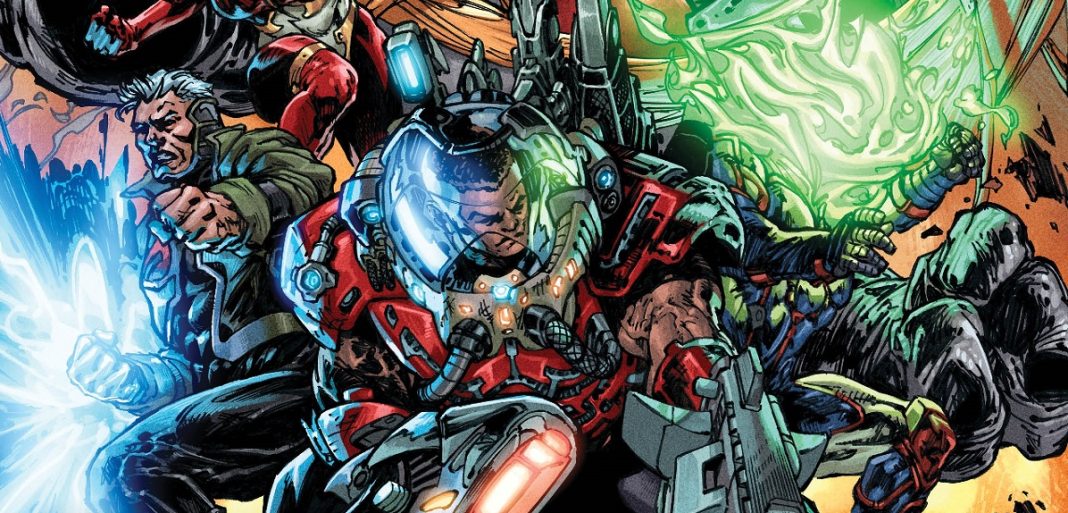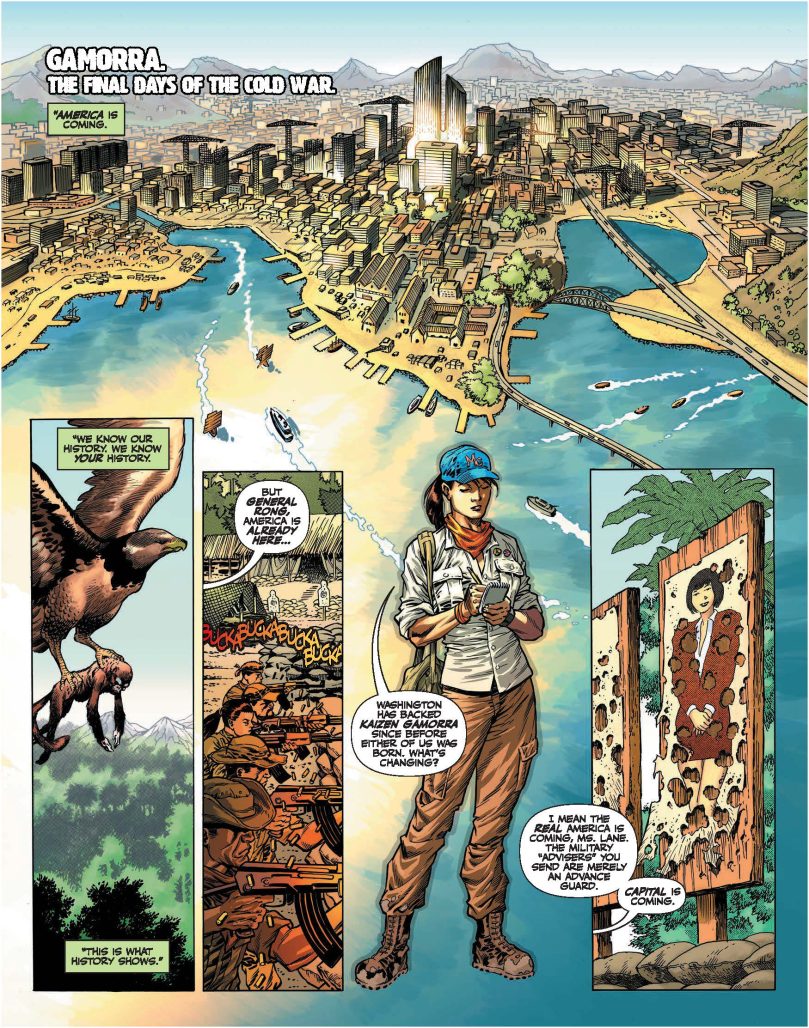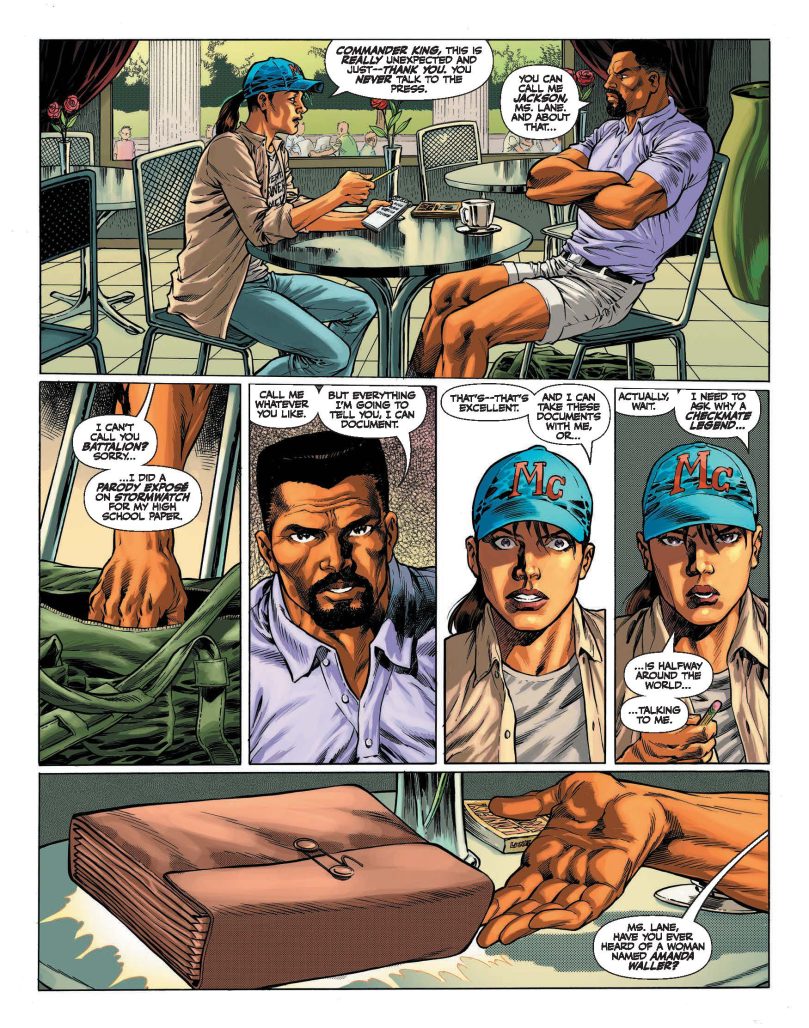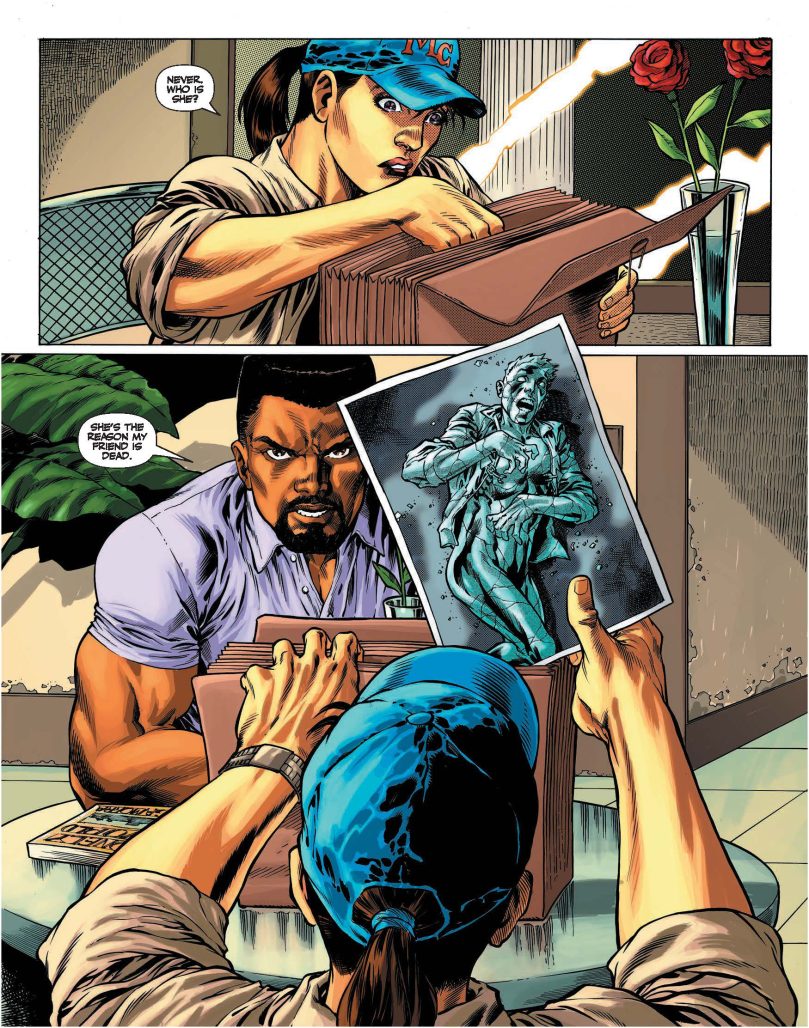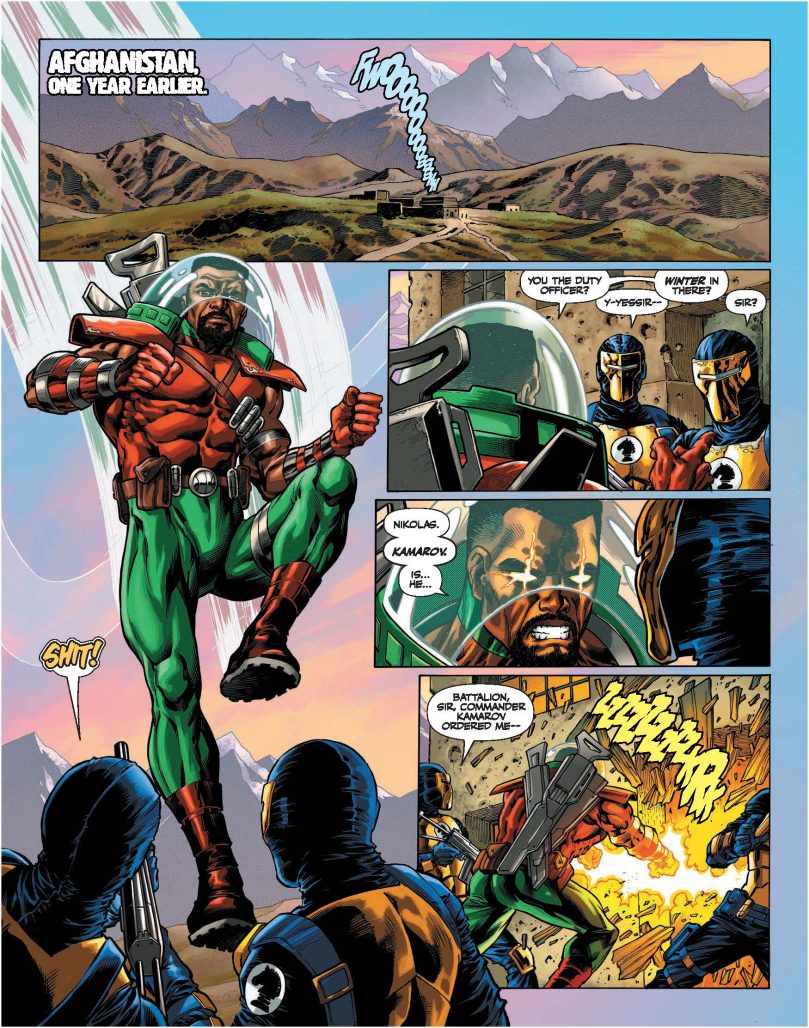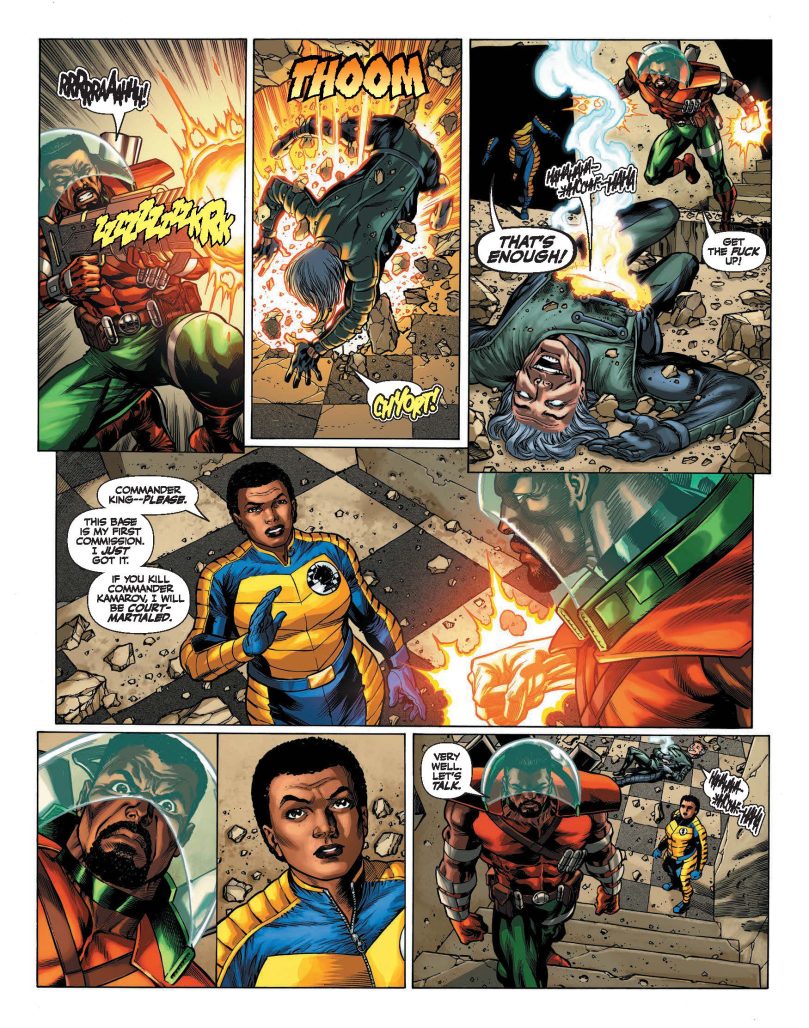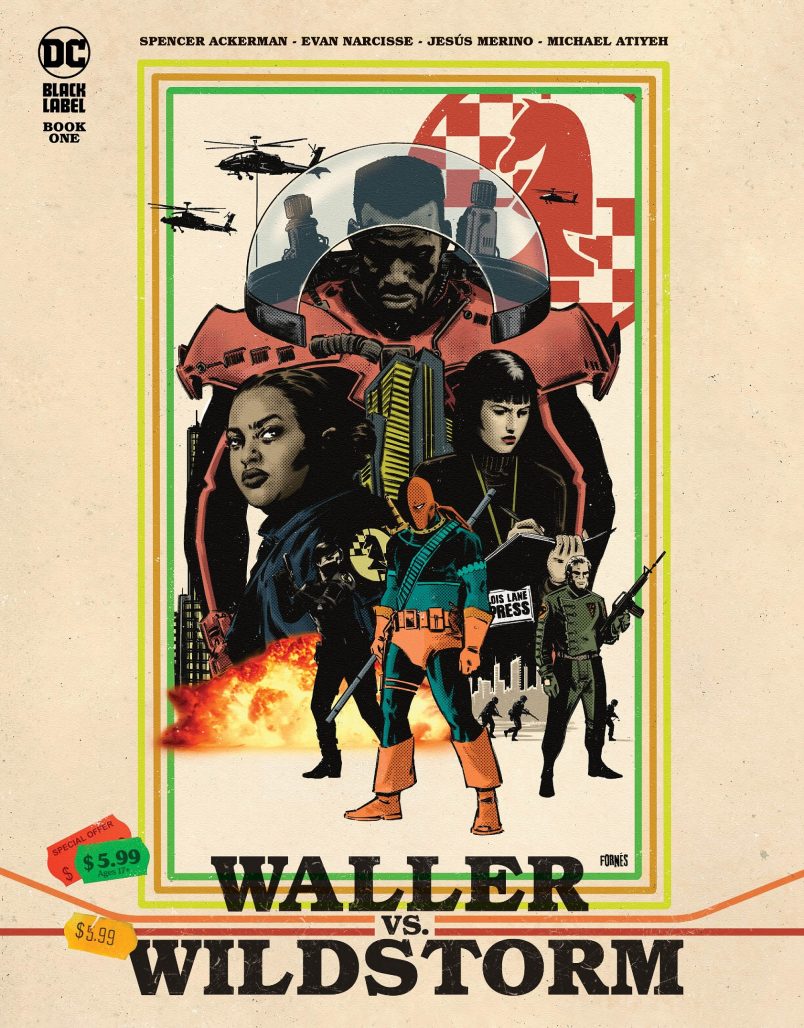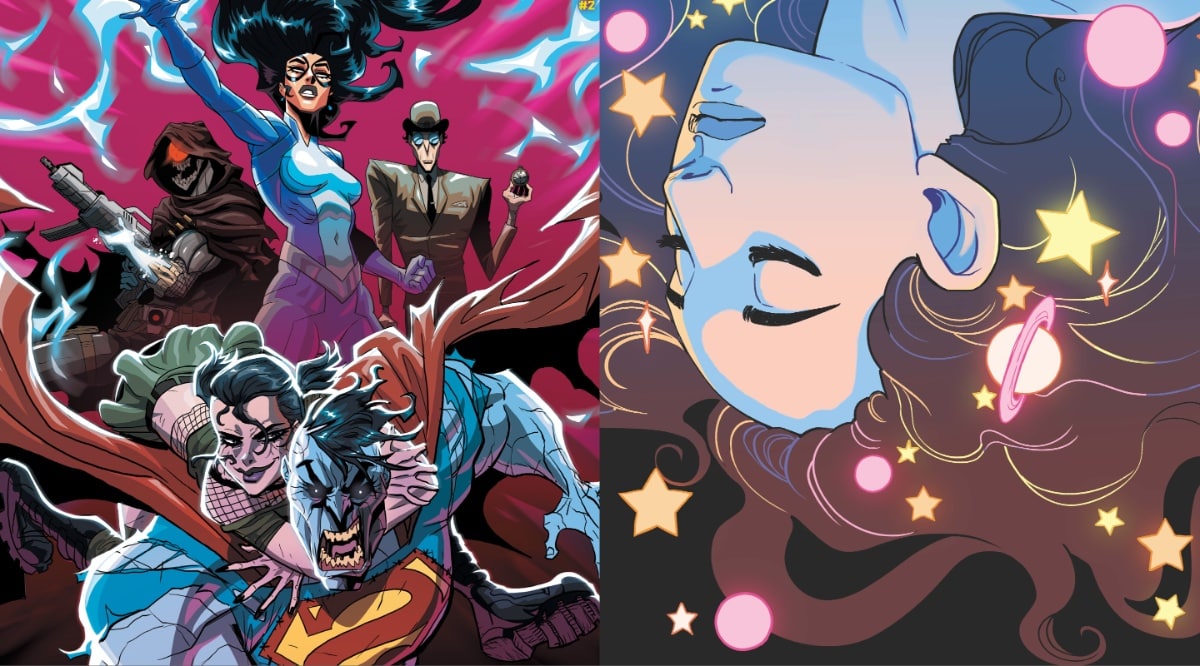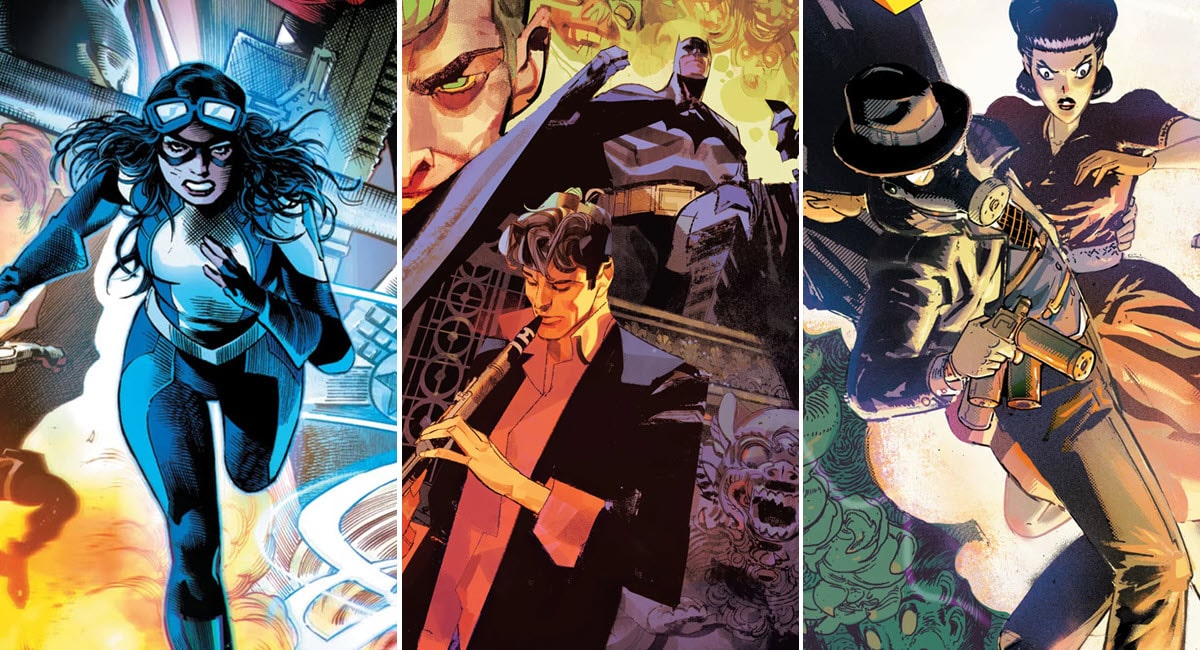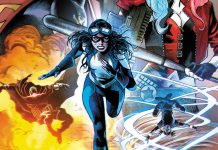The writing team behind the new Black Label series, Waller Vs. WildStorm, is perhaps a bit different than you find on the usual comics projects, in that they are both celebrated journalists as well.
Spencer Ackerman is a prominent national security reporter who has won a National Magazine Award and shared in a Pulitzer Price, covering the invasion of Iraq, global surveillance disclosures, and a long list of other stories that have shaped the geopolitical reality of our times. This series marks the first time Ackerman has written comics.
His co-writer, however, is more experienced in the medium. Evan Narcisse has written about video games, the video game industry, and comics for Entertainment Weekly, The Atlantic, The New York Times, and on the list goes, before transitioning to writing his own comics as well as developing the narratives of videogames. His first comic — 2018’s Rise of the Black Panther — was a critically-lauded success, paving the way for steady work in the industry ever since.
Together, they have now scripted a four-issue miniseries, Waller Vs. The WildStorm, which is illustrated by Jesús Meriño, colored by Michael Atiyeh, and lettered by Dave Sharpe. Ahead of the first issue release on March 28, Ackerman and Narcisse made time to talk about their influences for the new book, how their experiences inform the work, and much more. You can check out our conversation in full below…
Ackerman, Narcisse talk WALLER VS. WILDSTORM
ZACK QUAINTANCE: I wanted to start by asking about the decision to frame the whole first issue in the context of a Lois Lane interview…
SPENCER ACKERMAN: I’ve been a working national security journalist for 21 years now. When this all happened, when the pitch got approved and it became time to craft the book — Evan is an experienced and talented comic book writer, and I’m not.
EVAN NARCISSE: That is no longer true, Ackerman, but continue.
SPENER: I wanted this to be good, and I didn’t want to get too far into the realm of craft that I’m not prepared to execute well. I’ve been doing this Lois Lane role — obviously not as illustriously as Lois has — for long enough that an interview in a war zone is something I know how to do, an interview with a national security official at a hotel restaurant is something I know how to do.
Because this book owes so much to not just these characters in particular, but the spy thriller superhero stuff that the WildStorm Universe is so known for — and ultimately is a piece of spy fiction — I felt it would make a lot of sense for a reporter to go through this story, learn it, and see where that story would take her.
EVAN: Both Spencer and I have journalistic backgrounds — mine is kind of more in the rearview mirror — and a story like this set in the kind of world of skullduggery, dirty trick, black ops teams where the WildStorm Universe lives and thrives, for a story like that, you need a viewpoint character, someone who is encountering that ecosystem for the first time. We’re presenting her as an early to mid-career version of Lois Lane. She has some working knowledge of what the aboveground espionage landscape is; she really has no idea of how deep and dark and dirty things get in the WildStorm corner of things.
Using her as a viewpoint character felt like it just made sense. I just want to say upfront this is like 75 to 80 percent Spencer’s show. This is very much the story he wanted to tell, and I’m here to help him. That was a decision he made early on that felt really great.
ZACK: It seems like the reliability of different narrators and their perspectives is going to be central to this series throughout, is that the case?
SPENCER: Yes, absolutely central to the series. To give a quick coda to what Evan said and to your last question: allowing us to have a journalist work their way through the series in itself introduces reliability questions, about the source, about even when a journalist is as thorough as Lois is, perhaps they’re still not operating with the full story. We’ll be returning to this again and again throughout the series.
One of the things about WildStorm’s history of these themes of untrustworthy governments, untrustworthy corporations, untrustworthy security figures, is that they haven’t quite had an encounter with a Lois Lane figure. Putting someone like Lois particularly at an early stage of her career — before we know her as the Lois we know from Superman and the rest of the DCU — it gives a unique opportunity for a flashback year one story to show how this character and several others hone themselves through this early crucible.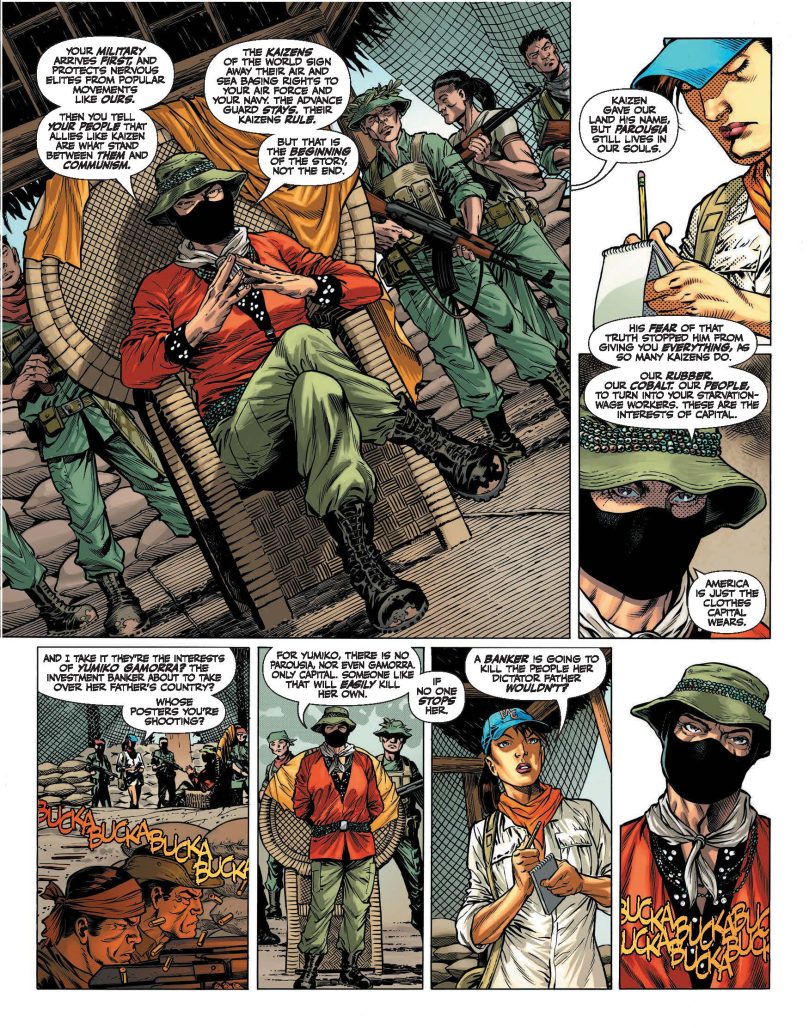
SPENCER: I’m a national security reporter. I write about the intelligence agencies, the military, the FBI, the Department of Homeland Security, and so on and so forth. At the risk of understatement, Amanda Waller is one of my favorite characters in comics. It was preordained for me that I was going to be drawn to this character, and the assignment from the start was to write a year one for her. My touchstones for the character are that [John] Ostrander original Suicide Squad run and Greg Rucka’s Checkmate.
In those comics, Amanda is a superhero and her superpowers are extreme competence and extreme ruthlessness. I thought, what we know about the character if we’re going to do a story set before events we may have seen, the character has got to be familiar and true, and the circumstances get to change. We see how someone like Amanda operates in a world before she has achieved the level of power — beuracratically and otherwise in the DCU. That was what went into that. It was a really exciting opportunity to see the character as we haven’t seen her before.
EVAN: I’ll double up on the praise for the Ostrander run, an amazing run, those Suicide Squad stories are burned into my brain, like the iconic cover where she’s dressing down Batman. I’d add to that my touchstones also being her depiction in the Justice League animated series. Amazing. I think it was CCH Pounder who voiced her. I might get some heat for this, but I like the way Viola Davis has played her too in the live-action movies. She gives you the implacable, badass church elder who will #(@* you up. That’s the vibe you get from her.
But to go back to the reliability thing is the thing about the WildStorm Universe and Amanda Waller and the Suicide Squad, is they all deal with geopolitics, and geopolitics is nothing but the churn of unreliability. Countries lie to each other, heads of state lie to their populous and their soldiers, and propaganda is wielded mercilessly in the realm of geopolitics. When you think about superheroes often being symbols of propaganda — this is going back to DC having Superman, Batman, and Robin ask people to buy war bonds in WWII and on throughout — it felt really natural to explore the realm of DC Universe/WildStorm Universe politics through Lois Lane, using Battallion as a symbol, with Amanda Waller being like, ‘okay, were do I fit into this.’ She’s going to find out some hard lessons along the way.
ZACK: I really liked the geopolitical stuff in here, obviously, but I thought there were some really great personal moments, too. Like the scene between Waller and Battalion, or where Lois has to call an antagonistic editor back at The Daily Planet. By the way, was that Steve Lombard?
SPENCER: It totally was. I needed a jerk at The Daily Planet, and it obviously can’t be Perry and it can’t be Jimmy and it certainly can’t be Superman.
ZACK: Perfect. But I was curious, how did your personal and professional backgrounds inform the book and those moments?
SPENCER: I’ve just been in several of the situations Lois is in in this book and that you’ll see in subsequent issues. Some of it was a way to process that. There’s a moment Lois has after it looks like she might have gotten in her own way that’s a pretty familiar moment to me — I think to a lot of reporters — and at the same time, the material this story touches on, I wanted very much for the book to be making the points Evan made about the unreliability of so many of these structures and how they raise questions about their interest in protecting the people they’re predicated on protecting, or at what point their own internal interests spiral out and start determining the scope of the world we live in. To get to do that with some of my favorite superheroes is just an absolute trip to do.
EVAN: My reporting career hasn’t been quite as high stakes and high-powered as Spencer’s, but I have had moments where you develop a source, you report a story, you develop a rapport with that source, and part of the job is putting that aside and then getting secondary sources, third level sources, to check what they’re saying. On occasions where you find out you’re being misled or you’re getting an overly angled version of a story, you report what that source suffers. Finding out the truth or the most verifiable version of a story is extremely stressful. So, Spencer and I definitely aligned on that.
In terms of the scene between Waller and Battalion — I don’t want to overstate things, Spencer — but being a Black person working in fields where Black people are underrepresented, when you see somebody who rises to the level of achievement like Battalion does in the story, I’ve been Waller in that moment, where I get to meet somebody I look up to. I’ve also been Amanda Waller in that moment — not in terms of scheming — but in terms of there’s a cusp of disillusionment that happens when you find out more about people you’ve looked up to. That’s something for me that I’ve experienced personally and have been able to put in this story.
SPENCER: Also, I just want to make clear — this is not a book about journalism. We’ve got elements of that in the book as a framing device and a way into the narrative, but you’ll see that this is really very strongly centered on Amanda. We’ll be coming and going with journalism throughout this series, but it’s not about that.
EVAN: To piggyback on all the stuff we’ve been talking about so far — Amanda Waller is a fascinating character because it’s a coin toss in any given story about whether you should be rooting for her. She can be the protagonist, but that doesn’t mean she’s acting heroically. Even when she is, her methodology is usually very morally grey. That’s something we really want to hit upon. Yeah, she’s surrounded by bad actors and we know her ultimate destiny is to be a bad actor in service of a good cause, but how do you get there? And who are the people she meets along the way?
She’s had people influencing here, and we get to meet one of those characters. This is just hats off to Spencer, but using Adeline Kane as a mentor to Amanda Waller was just such an inspired choice. We both love figuring out their interactions.
SPENCER: Also, Evan made absolutely crucial contributions to each and every single one of these issues from things as subtle as dialogue to things as profound as structurally aspects. You’ll see some of Evan’s characters come out in subsequent issues in terms of choices I think are absolutely inspired.
ZACK: Can you talk about how you came together to work on this, and what your collaborative process was like?
EVAN: I feel like we need to start with how our friendship began. We have mutual friends in common — Adam Serwer, Ta-Nehisi Coates — and Spencer was someone whose work I read but never met. I was guest blogging for Ta-Nehisi when he was still at The Atlantic, and you reached out, Spencer, and I think we had lunch?
SPENCER: He had just published Rise of the Black Panther, the first issue. I showed up with the book and a brand-new sharpie. I was thrilled to meet him. That’s such an incredible miniseries and for it to be the first comic Evan ever wrote, it had my jaw on the floor.
EVAN: To keep the mutual admiration going, the first time I met Spencer for lunch, he shows up with a pitch for a character in the House of Ideas, which, for me, is one of the great unmade pitches on a character. You’ll have to hit up Spencer’s DMs for more, but I kind of knew he could do it. Our friendship began where we’d just talk about comics, like when you have friends who share that passion.
Out of the blue, Spencer DM-ed me on Twitter with ‘I pitched this thing and I think DC actually wants to do it.’ It just went from there. But to fast-forward and answer your question, Zack, I helped Spencer work on the pitch and once it got greenlit and put in production, it became about how to approach the page, or how to approach communicating with the artist.
The thing I always come back to when I talk about craft in comics is that every write I know does it differently. While there’s a lot of freedom with all that disparity of approach, there can also be a lot of confusion in terms of how do you hone in and tell the artist exactly what you want them to draw. How do you communicate body language and facial expression? Something I stole from Kieron Gillen is he always talks about thinking about what the characters hands are doing. It’s something you don’t necessarily think about in real life, but it can add to the toolkit your artist has to use. For me personally, I always find myself thinking about the dimensionality of a page and of a particular panel. I will specifically call out in scripts foreground and background. The way I think about it, those can be two tracts that each have a storytelling thread moving through it.
But Spencer’s ear for dialogue is bananas. One of my favorite comic book writers — Denny O’Neil — had an insane ear for dialogue, and Denny was a journalist as well. I don’t want to lump us in with one of the greats, but when your job is to listen to people talk, you pickup the quirks. I think Spencer is really great at that.
SPENCER: I’m grateful for so many things about Waller Vs. WildStorm but foremost among them is I got to learn how to write comics from Evan. Even before we did this, he was gracious enough to share some scripts with me so I could try and start reading the way he structured a page to see if I could get the internal logic with it, and when I couldn’t, I could ask him about his choices. I didn’t know how to approach writing a comic book script. Usually, the advice I’d gotten boiled down to there’s no real one way to do it. So, it was from Evan I got to learn things like you have to write for the turn of a page and how to use that to build narrative momentum or in a different scene to build dramatic irony. That was a skill where my tank was on zero for that; I didn’t know what I didn’t know. I’m very grateful that I come out of Waller Vs. WildStorm, and now I feel like I’m on the first rung. I’m very grateful to Evan for that as well as to Chris Conroy and Marquis Draper.
ZACK: It seems like this all went really well. Any chance you’ll write more comics together?
EVAN: We’ve talked about it.
SPENCER: We’ve talked about it for years. I’ll speak for myself — it’s so much fun to do this with a friend. As corny as that may sound, Evan before he signed on to work with me on this was used to all of a sudden looking at his phone and seeing an eight-message text rant about something utterly meaningless or stupid or about what’s in the news. I think I would have not been able to bring my full self were I writing this with someone I hadn’t already been friends with.
We should also praise to the heavens Jesus Merino. You’ve seen him draw the most iconic characters DC has — Superman, the Justice League — and I’m blown away that I’m so lucky that on my first time out I got to work with such a master of the craft. I think long-time fans of Jesus are going to see something unlocked that we haven’t seen before. He had to take subtle direction from an absolute amateur like me, and the things he did with it — I’m blown away.
EVAN: The other things that were really gratifying were when we had our first conversations with Jesus, he was throwing out references that were just perfectly in line with what we were trying to do on this book — All The President’s Men, The Parallax View — that were just classic psychological and espionage thrillers. That helped so much because when you’re writing the script, you have to account for what the artist may not know. But when you know that they’re dead on in terms of the zone we want to land in, then that just makes writing the script so much easier.
The same is true of Jorge Fornes. When his covers came in…oh my god. Making comics can be hard and stressful especially when you have a day job like me and Spencer. But when the art comes in and you’re like okay they nailed it? It’s like give me more, when’s the next page coming in?
ZACK: Anything else either of you want to add before we wrap up here?
EVAN: The thing for me that I really enjoyed in this series is we think about the WildStorm Universe as an artifact of the ‘90s — the costumes, the character designs, the powers, and the way they told stories — but the thing to me that has been most enduring is that there’s so much melodrama in the WildStorm Universe. It is high-level soap opera told with guns and backstabbing. Getting to play with that has been really really fun. Within superhero fiction, we get a lot of paragons of virtue. It’s nice to see just how morally questionable an idea in a superhero universe can be. Paring Waller and WildStorm up — two of the most morally slippery characters or character universes — it just feels really good to play with this stuff.
SPENCER: We wanted to really put what we thought was some critical stress on not just foundational stress of those universes — and we have freedom to do that because this book is out of continuity as a Black Label book — but with references to our contemporary situations, geopolitically in terms of relationships between America as a democracy and America as a geopolitical hegemon. One of the ways that WildStorm sort of has a lot of these questions baked in is you get to look at these structures and ask whether within them heroism is possible and if so how, and if these structures are in effect exploiting people’s desires to be heroes, but within their own contexts and for their own purposes.
That’s central to this series, and I think it’s a pretty salient question for us in our universe.
Waller Vs. WildStorm #1 is available March 28, 2023.


